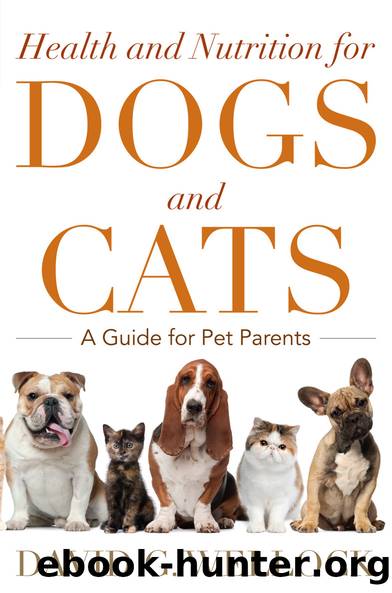Health and Nutrition for Dogs and Cats by David G. Wellock

Author:David G. Wellock [Wellock, David G.]
Language: eng
Format: epub
Publisher: Rowman & Littlefield Publishers
Published: 2013-09-15T00:00:00+00:00
The Treat Trap
Humans think they are smarter than their pets. Pets, I suspect, think they are smarter than humans. Thereâs ample evidence supporting both positions.
âDave Wellock
I have two areas of concern regarding the feeding of treats to Whiskers and Spot. The first concern is overfeeding. There seems to be a logic gap here, as I have noticed many of my customers donât associate treats with food. I suppose it comes from our own attitude of not considering that quick snack as being food. We consider it a little treat or a snack, anything but food. Not only is it food, it may be extremely high in calories; read the label. If you find yourself in this group, itâs time for a rethink. Your petâs treats are food. (And by the way, so are those little snacks you enjoy.)
When a customer comes into the store to discuss a weight issue regarding their pet, a portion of the conversation will involve me attempting to ascertain how many treats the pet receives on a daily basis. Youâd be surprised how many paropets donât really have a good grasp on the quantity of treats doled out during the course of a day. Worse, in a multiperson household, they usually have no idea how many treats are being handed out to Whiskers or Spot by the other two-footers. Three or four medium-sized dog biscuits, to a small or medium-sized dog, can be the equivalent of a meal, or at the very least, a significant portion of a meal. To my point of view, treats are occasional pleasures, a reward for good behavior or even sometimes just as a thank you for being you.
If youâre one of the guilty people freely dispensing rewards throughout the day, I suggest you stop the practice and implement some disciplineâfor your pet and for yourself. Spend a few minutes to determine how many treats your pet receives each day. Count them out into a measuring cup to get an idea of the volume of food those treats represent. Donât be shocked if you find it results in more food than you anticipated. Now you have two options: either reduce the number of treats youâre feeding or reduce the amount of food provided in the petâs regular meal. If, for example, your dog should receive two cups of food daily, then consider it as two cups of combined food and treats. Anything else qualifies as overfeeding and will contribute to unwanted weight gain, along with all of the problems associated with obesity.
My second concern regarding treats involves planned expectations. Even more surprising than not realizing how many treats are being served, many people have no idea that their cat or dog has, in fact, trained them to deliver treats. Thatâs right, we two-foots are the ones who are often the trainees; the pet is calling the shots. Every dog Iâve ever shared a roof with has known which cupboard door hides the treats. I have been led into the kitchen countless times, only to have them stare fixedly at one cupboard .
Download
This site does not store any files on its server. We only index and link to content provided by other sites. Please contact the content providers to delete copyright contents if any and email us, we'll remove relevant links or contents immediately.
Outback Vets by Annabelle Brayley(148)
The Exchange Student by A J Carter(127)
An Unspoken Art by Gutkind Lee;(108)
Where there is no animal doctor by Birmingham Maureen(106)
The Veterinary Workbook of Small Animal Clinical Cases by Ryane E. Englar(97)
Sperm Morphology of Domestic Animals by J.H. Koziol & C.L. Armstrong(93)
Health and Nutrition for Dogs and Cats by David G. Wellock(86)
Veterinary Microbiology by Scott McVey & Melissa Kennedy & M.M. Chengappa & and Rebecca Wilkes(64)
Manual of Animal Andrology by Peter J. Chenoweth & Steven P. Lorton(52)
Sperm Morphology of Domestic Animals by J. H. Koziol C. L. Armstrong(48)
Animal Suffering, Human Rights, and the Virtue of Justice by Per Bauhn(48)
Diagnostics and Therapy in Veterinary Dermatology (Dawn Logas) by Logas Dawn(40)
Veterinary Head and Neck Imaging by Peter V ScriVani(39)
Diagnostics and Therapy in Veterinary Dermatology (Dawn Logas) (z-lib.org) by (Dawn Logas)(34)
